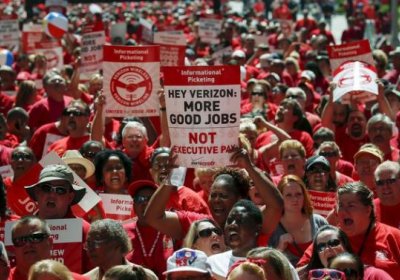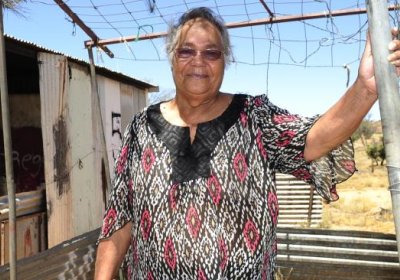As a sagging economy cruelled their electoral chances, right-wing parliamentarians and power-brokers in the South Australian Labor Party decided in late 2014 that it was time to ditch a once fiercely-defended point of policy. The party's remaining opposition to the nuclear fuel cycle would have to go.
Labor Premier Jay Weatherill soon came on board, and by March last year the state's Nuclear Fuel Cycle Royal Commission was under way.
1091
Nearly 40,000 Verizon Communications workers walked off the job on April 13. Joined by US Democratic presidential candidate Bernie Sanders, they protested a lack of progress in contract talks more than eight months after their agreements with the company expired.
150 people rallied at the Stirling Gardens and then marched through the streets of Perth in protest against ongoing Black deaths in custody in Australia.
I had a call from Rosalie Kunoth-Monks the other day. Rosalie is an elder of the Arrernte-Alyawarra people, who lives in Utopia, a vast and remote region in the "red heart" of Australia.
The nearest town is Alice Springs, more than 300 kilometres across an ancient landscape of spinifex and swirling skeins of red dust. The first Europeans who came here, perhaps demented by the heat, imagined a white utopia that was not theirs to imagine; for this is a sacred place, the homeland of the oldest, most continuous human presence on earth.
At the edge of the south east, the Arctic is nebulous, but its ice shards are felt on the hands, and you can feel tingles of dim isolation in the wildness of Tasmania's oceans.
Sequences and currents from Tasmania's Huon Valley rivers and Cygnet Bay dip to the deep-sea behind the pristine Bruny Island. The bio-network of inlets, bays and streams move lightly and serenely downwards with the humid vapour of the mountains. Sheltered water habitats protect rare crays, platypus, seals and southern right whales.
Thousands of jobs are once against at risk in Australia's shrinking steel industry as Arrium, the company that owns the steelworks in Whyalla, South Australia, announced it was having difficulty servicing its more than $2 billion loan. The company wants the government to bail it out and that seems to be the only “solution” that the union movement and the major parties can imagine.
But will a bailout save jobs or even save what is left of the steel industry in Australia? The historical record suggests otherwise.
The Mike Baird government's push for local government to roll over to its forced amalgamation push is looking decidedly shambolic.
The NSW government wants to reduce 43 Sydney councils to 25 and 109 regional councils to 87. It has argued that efficiencies and savings will be made by doing so. But it is facing stiff opposition from progressive and conservative councils alike. Even federal Liberal and National MPs, worried about their seats, have urged Baird to back off.
In all the official Anzac 100-year commemorations to remember and celebrate the undoubted courage of World War I diggers, there is an extraordinary amnesia about how ambivalent Australians were about that war. This ambivalence grew as mounting casualties affected families all over the country and the 1916 Irish Easter Uprising was brutally supressed.
- Previous page
- Page 4






